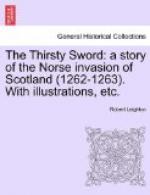“And now,” said he, “if there be any amongst you who would dispute my kingship, let him stand forward and I will prove myself with the sword.” And he threw down his gauntlet from his girdle.
No man stood forth. But an aged woman who was of the crowd let down from her arms a little child, and the child toddled forward and picked up the glove and handed it to the king. Kenric, bending his strong back, took up the child in his arms and kissing its two rosy cheeks, raised the little one on his shoulder, and carried it back to its grandam.
Then as he did so, many mothers held up their children that these too might share the honour he had done the first. So Kenric went round bestowing his kisses and his blessings upon the innocents. And the fathers and mothers thought well of their young king for this that he did, for it showed them that he had a tender and loving heart. Then they cheered him yet again, until their lusty voices grew hoarse.
At length, when all was done, the people went peacefully to their homesteads, talking of what they had just seen, yet little thinking how soon the time would arrive when they should owe the lives of their innocent children to the wisdom and bravery of this boy king.
CHAPTER XIII. THE “WHITE LADY” OF THE MOUNTAIN.
On the second morning after his throning, Kenric, assuming again his clothes of deerskin, walked over to Kilmory Castle, and there held counsel with his steward concerning the way in which he was to pay tribute to his overlord the King of Scots. As a newly-elected king it was necessary for him to offer homage to King Alexander in person. But he did not yet know in which of the royal castles his Majesty might be found, and he had need to cross over to Arran to make inquiries of Sir Piers de Currie, who, as he knew, had lately had audience with the King.
Sir Oscar Redmain, in giving him his instructions, asked him if his son Allan might accompany him to Scotland.
“There is no youth in all Bute whom I would rather take with me,” said Kenric, “for I have now no comrade of my own years since my brother Alpin is no longer alive; and methinks that Allan might well become to me the true friend that he ever was to Alpin. If he will come with me even now I will take him across to Castle Ranza, and we may then speak of our approaching journey.”
Allan was then out in the fields, but he was soon found, and the two lads, armed with bows and dirks, went together down to the bay of St. Ninian’s. Four fishermen there launched a boat for them, and rowing out under the little island of Inch Marnock, they then hoisted sail and sped across the Sound of Bute with a fresh western wind.
Not long were they in crossing the channel between Bute and Arran, and at the northwest of the latter island they steered round into the beautiful and quiet Loch Ranza. At the head of this inlet of the sea, and standing out upon a narrow neck of land commanding the bay, was Sir Piers de Currie’s castle. Like many of the smaller fortresses of that time, the castle of Ranza was built, not of stone, but of heavy oak timbers of double walls that were filled in between with stones and turf, and so wondrously strong and thick that fire alone might destroy it.




